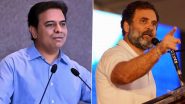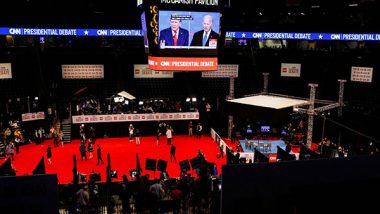Atlanta [US], June 28 (ANI): In a highly anticipated event on Thursday night, President Joe Biden and former President Donald Trump engaged in a fiery debate broadcast live on CNN.
The age disparity between the 81-year-old incumbent and his 78-year-old challenger was starkly apparent throughout the evening, with Biden notably hoarse and exhibiting limited vocal range, struggling at times to articulate clear differences from Trump.
At one contentious moment, Biden's defence of his border security record trailed off, prompting Trump's sharp retort: "I really don't know what he said at the end of that sentence. I don't think he knows what he said, either."
Trump, known for his election denialism, reiterated his claims about fraud in the 2020 election, despite asserting he would accept the results of the 2024 election if deemed "fair and legal."
Biden, in response, accused Trump of whining and reminded him of his prior electoral loss, according to CNN.
This debate marked the first face-off between a sitting president and a former president in history, covering contentious issues such as abortion, immigration, foreign policy, and inflation. The exchange took a personal turn when Biden highlighted Trump's criminal convictions, which Trump countered by invoking Hunter Biden's recent legal troubles. Biden then accused Trump of having an affair with Stormy Daniels while his wife was pregnant, a claim Trump vehemently denied.
Key takeaways from the CNN debate:-
Biden's age and performance
Biden's advanced age and physical condition came under scrutiny as he struggled with hoarseness and unintelligibility throughout the debate. His attempts to cite statistics and legislative achievements were often marred by stumbling and a lack of vocal clarity. Despite attributing his performance issues to a recent cold, concerns within the Democratic Party about Biden's nomination for a second term are likely to intensify following this debate.
Questions arise over Biden's debate strategy
President Joe Biden faced significant challenges during Thursday night's debate on CNN, with his physical condition becoming a focal point. His hoarse voice and visibly tired appearance, often depicted in split-screen images widely shared online, overshadowed his objectives for the evening, which remained unclear after the 90-minute exchange.
In contrast to their initial debates four years ago, where Biden scrutinized Trump's record and presented a hopeful vision, Thursday's message appeared muddled. Biden, being the incumbent, found himself predominantly on the defensive. Despite attempts to explain his first-term policies, he struggled to resonate with his "Middle Class Joe" persona that had been a cornerstone of his political identity.
His critiques of Trump were also inconsistent, and he faced difficulties in fact-checking the former president's longstanding falsehoods, particularly evident during their exchanges on key Democratic issues like abortion. Biden's responses sometimes became tangled in complex statistics, such as when discussing Trump's tax policies for the wealthy.
At another point, he likened Trump's job loss record to Herbert Hoover's, saying, "Trump is the only president other than Herbert Hoover who lost more jobs than he created."
Biden's prepared rebuttals drew from the expertise of unnamed constitutional scholars, historians, and Nobel laureate economists, attempting to bolster his arguments, according to CNN.
Historically, incumbents often stumble in their first debates, and Biden's aides had reportedly over-prepared him during a week-long session at Camp David to mitigate this risk. However, his performance failed to allay concerns about his ability to effectively lead and left voters uncertain about his vision for the future.
Biden's tactical use of one-liners
Throughout the debate, Biden employed a strategy of using one-liners to counter Trump's arguments.
A standout moment for Biden came when he referenced a 2020 report from The Atlantic alleging that Trump had disparaged American war dead as "suckers" and "losers." Biden emotionally defended his late son Beau, a veteran who died of brain cancer, by contrasting him with Trump.
"My son was not a sucker. You're a sucker. You're the loser," Biden declared.
During a discussion about Trump's legal troubles involving Stormy Daniels, Biden attacked Trump's character, stating, "You have the morals of an alleycat."
Contrasting responses on January 6
The starkest contrast between Biden and Trump during the debate emerged in their responses to the January 6, 2021, attack on the US Capitol.
Biden directly addressed the events, criticising Trump's role. He accused Trump of inciting the violence and remarked that while the Capitol was under siege, Trump "sat there for three hours watching" as his staff pleaded with him to intervene.
In contrast, Trump avoided directly addressing his actions on that day. He instead focused on touting his administration's achievements, such as border security, energy independence, and tax cuts.
The former president did not address the content of his speech before the Capitol riot, where he urged his supporters to "show strength."
Trump shifts focus to controversial abortion pill position
Amidst a debate dominated by pressing issues like the economy, inflation, immigration, and foreign policy, abortion unexpectedly became a pivotal moment, one that should have been President Biden's strong suit. With recent Supreme Court decisions favouring abortion rights and Democratic voters still reeling from Roe v. Wade's reversal, it was poised to be a defining topic. However, Biden faltered, struggling to articulate his party's stance, occasionally appearing flustered, and inadvertently providing Trump an opportunity to pivot to crimes committed by migrants, CNN reported.
Earlier in the month, the Supreme Court dismissed a case challenging access to the abortion pill mifepristone, a decision Trump publicly supported during Thursday night's debate.
Expanding on his stance, Trump reiterated his belief that abortion regulation should be left to individual states, reiterating his claim, debunked by legal experts, that "every legal scholar" advocated for curtailing federal abortion protections. He underscored his support for exceptions in cases of rape, incest, and to safeguard the mother's life.
Despite Biden's campaign emphasis on reinstating abortion access, his response veered off-course, allowing Trump to segue into discussing crimes committed by migrants, which detracted from Biden's intended focus on reproductive rights.
Divergent paths on Israel and Gaza
In a charged exchange over Israel and Gaza, the debate between Trump and Biden revealed stark differences in their approaches to the ongoing conflict.
Trump asserted that he would handle the Gaza war differently from Biden, urging, "Let Israel finish the job." His statement implied criticism of Biden's perceived restraint on Israeli military actions against Palestinians in Gaza.
Regarding a Palestinian state, Trump didn't explicitly state his position but asserted that Hamas wouldn't have carried out its October 7 attack on Israel if he had been in office, adding a jab that Biden is like a "bad Palestinian" whom Palestinians don't respect. This remark seemed aimed at portraying Biden as overly sympathetic to Palestinians yet ineffective in their eyes.
However, Trump's remarks seemed to fall flat without significant impact.
Biden's response lacked substantial elaboration. He emphasised America's steadfast alliance with Israel and the fact that the US provides Israel with comprehensive military support. This stance, however, didn't seem designed to attract progressive votes.
Trump also mentioned a ceasefire deal he had discussed previously, though it has yet to materialise and appears to be a non-starter with leaders from both sides.
Trump avoids clear stance on deportations
During the immigration segment of the debate, the standout moment wasn't Trump's avoidance.
But he didn't directly address whether his promised severe crackdown on immigration would include deporting those who have been in the United States for decades, those with jobs, or those whose spouses are US citizens.
Instead, he shifted to criticising Biden, arguing that the president is responsible for crimes committed by undocumented immigrants since taking office.
Trump pins foreign policy failures on Biden
According to the former president, the current one isn't up to the task.
The US military "can't stand him" for several reasons, most notably his mishandling of the Afghanistan withdrawal. Russian President Vladimir Putin was "encouraged" by him to invade Ukraine. Iran, which was financially strained during his administration, was empowered by him to wage a proxy war against Israel.
Trump portrayed a grim view of global politics under Biden's leadership. He also once again avoided making a firm commitment to NATO, instead boasting about his efforts to ensure member countries were up to date with their financial contributions. Only after being pressed on the issue did he state that Putin's terms for ending the conflict in Ukraine were unacceptable.
In response, Biden dismissed Trump's claims as "malarkey."
According to Biden, it was Trump who emboldened Putin, leading up to Russia's invasion. Any encouragement, he argued, occurred during Trump's tenure, when he engaged closely with the autocrat.
Biden's rationale for continued US support for Ukraine centered on two main points: Firstly, he stressed its importance as a strategic priority, believing Putin's ambitions extend beyond Ukraine's western border. Secondly, he reiterated his belief that NATO's existence inherently strengthens the United States, providing a more robust position in global affairs through its close alliance with Western Europe
Clash over Black and Latino voter appeal
During the debate, Trump seized the moment to appeal to Black and Latino voters while criticising Biden on inflation. Biden's electoral prospects hinge significantly on Black support in key battlegrounds like Wisconsin, Michigan, Pennsylvania, and pivotal states such as Georgia and North Carolina. Recent polling suggests Trump is making modest gains among Black voters, particularly men, while others remain disengaged from the election, according to the CNN report.
Asked about his message to Black voters, Biden acknowledged their concerns despite record-low unemployment, citing disparities in wages, maternal health, and incarceration rates. He highlighted his policies to alleviate student loan debt but conceded ongoing challenges with inflation.
The discussion then shifted to policing, with Biden accusing Trump of attempting to cut police funding. Trump countered with an inaccurate claim, attributing the "super predators" remark to Biden in the 1990s, which was actually made by Hillary Clinton. He touted his criminal justice reform efforts and partnership on opportunity zones with Senator Tim Scott of South Carolina.
"The biggest beneficiaries are Blacks, and that's why we've achieved the best numbers with them in maybe forever," Trump declared.
The pandemic: Biden and Trump duel over economic responsibility
When confronted about their economic legacies during the debate, Biden and Trump found common ground in blaming the pandemic. This echoed their debates from 2020, where COVID-19 became a pivotal issue.
At the outset of the debate, the spotlight turned to one of Biden's major reelection challenges: inflation. Biden pointedly remarked that he inherited an economy in dire straits due to Trump's handling of the COVID-19 crisis. He criticised Trump's initial dismissal of the severity of the virus, recalling Trump's suggestion of injecting disinfectant as a remedy.
Referencing a nonpartisan report mentioned by Tapper, which indicated he accumulated twice the federal debt compared to Biden, Trump asserted that his administration was on the brink of reducing the national debt before COVID-19 struck. He then pivoted to critique Biden's management of the pandemic, particularly targeting vaccine mandates imposed by the current administration, CNN reported. (ANI)
(This is an unedited and auto-generated story from Syndicated News feed, LatestLY Staff may not have modified or edited the content body)













 Quickly
Quickly
















